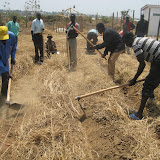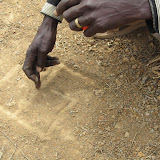Steve and I are taking turns writing the blog entries each week.; it is my turn (Diantha) to write the blog entry for our third week. We are thankful for friends and family. We have had a few live Skype (free phone over internet) sessions with video with some family members. Totally amazing. The internet is somewhat on and off depending on clouds blocking access to the satellite. My laptop, which is several years old, apparently isn’t up to date enough to receive the more modern Wi-Fi from the UMCOR (United Methodist Committee On Relief) office; we are living 50 yards from them on their compound in their guest house, shared with Boo and Phyllis Hankins (click the photo link on this blog page.). I’m using Steve’s email address as it is easier to access and has our complete address book. Request: please become a “Follower” to our blog to get an email reminder when we have posted something new.
There is a team of 6 people visiting from our home Holston Conference. Steve is helping a lot with errands for them. They are here primarily to supply furnishings for the new guest house which is being built. It will be the residence of Boo and Phyllis, with guest rooms and a bunk room to also house visiting teams (up to 14 people). It is a short 5 minute walk from where we are, along a grassy lane (see photo of how Yei feels rural). The donor, Rev. Linda Bird Wright is here. It is nicknamed “Captain’s House” in memory of her late husband, who was an airline captain. Linda is receiving ongoing chemotherapy for lung cancer, and has scheduled this trip between treatments. She is truly an inspiration to us.
Steve has been the busiest one this week, as I was under the weather for several days with some little bug (better now). There is little ready made furniture here, so we just set up the 5 foot wooden table he ordered as book shelf and desk for two! We are both able to go to the weekly pastor’s meeting in Yei, along with our team, where Steve describes how to avoid a snail infestation in the garden (see photo). The easiest way is form a 2-3 meter cleared margin around your garden, and then pick them off by hand; they don’t like to cross open soil. We know an agriculturalist at the Christian Reformed World Relief Council here who donated hoe blades, and peanut and sorghum seeds to give some to each church. These are some of the things they have been asking for. It is time to do the last planting of the rainy season. In the rural areas, most people barely survive by subsistence farming, though they can't cultivate quite enough land to feed themselves and sell the excess. The land is quite fertile, but all labor is by hand tools.
We visit two rural churches along with the team. They present their list of needs, which as usual includes the need for a better shelter than the open thatch roof (especially from the rain), which now houses the church as well as nursery students (with spill over seating under the trees). You should hear the clapping when they were told they will each have a covenant relationship with certain Holston Conference churches (represented by the team), who will help them with the cost of building a “permanent building”, especially for the “iron sheets” (ie corrugated metal roof). Church members will be asked to provide river sand, rocks, home made mud bricks, local logs and some labor. At Ligitolo United Methodist Church Pastor Cosmos Ali is given candlesticks and candles, and a ceramic chalice and paten for communion (photo.) Churches have a simple table in front with a tablecloth, and sometimes prayer cloths hanging from the rafters, so the gifts represent an elaborate addition. They also receive a photo album of them taken at a previous team visit. I would imagine most people have never seen a photo of themselves. Adults and children alike gather around and laugh out loud at themselves and their friends. As at every church we visit, there are sick people who come forward with their needs. The abandoned mother, whose child’s school fees are paid by Holston, has a horrible toothache. Looking inside her mouth, I see half the tooth is eaten away by a cavity. Fortunately one of the clinics in Yei has added a dentist, the only one here. It costs about $10 to get a tooth pulled, so she is given the money. It turns out she doesn’t have the $2 also needed for a round trip on the taxi motor cycle. I am struck by the realization of how many things I am able to afford for $2 or more, and what a privilege access to health care is. In many villages, they do not have local pharmacies, and it would be too far to walk to one. We give her all the Tylenol we had in the medical kit in the land cruiser. When folks see we have medicine we were approached: “I have had a headache, fever and vomiting every time I eat for two weeks. I went to the hospital, but I am not better “. “I also have a headache”. The Tylenol was gone. Some could afford to go to the clinic. The hospital does not have enough staff, nor well trained staff to really treat disease. The local non-profit clinics are better. We have also been given used eyeglasses by churches to hand out. People flock to the land cruiser. They have to just find a pair by trial and error (reading glasses are the most popular). One teenager has infection in both eyes. Another gets glasses so he can see the blackboard. While there is a new opthamologist at a clinic in Yei, few of them can afford the fees or the journey; I think about the fact that I have been wearing glasses since I was 7 years old and would have a poorer education without it. While we are at the churches, I also help get the names, photos and stories of some of the orphaned children, who are living with relatives (see photo). Libby Dearing is on the trip; she is part of the team looking into having an orphanage built here. A good many of the children are wearing tattered clothing; many if not most I am sure could use more food as well. The families in the villages don’t have money to pay the school fees, which pay the teachers, nor to bring much in offering to pay the pastors. They are being encouraged to bring garden produce. Pukuka church has a few ears of dried corn hanging from the ceiling. They are proud to show that they are starting to do as they are being taught!!
An additional highlight, especially for me who loves stringed instruments, is hearing a large and small odungu (see photo) accompany the choir. The strings tuned to the same scale as we use, and the notes of the chords are plucked rhythmically (but not like a guitar strum); the sound sort of reminds me of a thumb piano. We usually think of Sudan as a place of poverty, but it is rich with cultural (and spiritual) riches like these.
Sunday, September 12, 2010
Subscribe to:
Post Comments (Atom)
















We are so proud of the work you are doing!
ReplyDelete